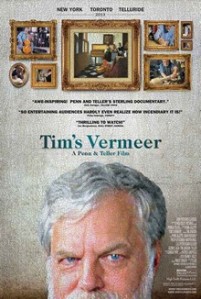On Twitter came this question.
A certain kind of learner of any subject could successfully manage a scholarly investigation of any problem or question without a doctoral program. Indeed, Tim Jenison, the subject of the documentary film Tim’s Vermeer, is this kind of learner. He worked for more than five years to investigate a hypothesis as to how Vermeer obtained a photo-type effect in his paintings. He is the kind of learner doctoral supervisors long for and sometimes experience; the zero-maintenance learner. Look ma- what Jenison did with no-hands-on from a doctoral program.

For centuries Vermeer’s paintings so dumbfounded that they were described as if painted by magic. In the book, Secret Knowledge by artist David Hockney, Hockney argues that some optical techniques must have been employed by the masters like Vermeer. The book spurred Jenison’s exhaustive and lengthy quest to test an optical technique he thought Vermeer might have used.
In what would become a serendipitous dinner conversation with his friend Penn Jillette, an entertainer and entrepreneur, Jenison’s quest to discover the centuries old secret of a Vermeer painting, resulted in a successful pitch to a documentary film funder. So all the elements for a work of scholarship came together: a problem, a (vague) plan, and a funding source.
(Jenison didn’t need the funding or the filmmakers, he’d started into the investigation before talking to Penn. The film producers, Penn and Teller, a magic act in Las Vegas, added to the depth of his scholarship getting him access, for example, to a Vermeer few see as it is part of a private collection of the Queen of England. The film also made his research known, something that Jenison hadn’t planned to do and is not required of early career researchers.
The film not only disseminates Jenison’s work but records the intensity of scholarly pursuit, wherein the scholar/hero suffers trials. The drama in the film comes from watching Jenison’s relentless toil, hot on a quest that takes him more than half a decade, across continents, and into the painstaking reconstruction of the setting for the Vermeer that he paints. This is a story of desire).
But is Jenison’s work worthy of entry-level scholarship; the early career researcher stuff that gets a Ph. D? The work checks the boxes needed by any self-respecting committee member examining a work of doctoral research. It has:
1. An original contribution to knowledge: Jenison tested a hypothesis that Vermeer used a mirror device to get his ‘painting with light,’ photo-like effect.

2. Placement in the literature: Jenison read exhaustively to answer his questions. In so doing, he became expertly acquainted with Vermeer’s oeuvre, optics during the Dutch Renaissance, and the present day investigations which advance knowledge of optical applications of painters in the time in which Vermeer lived. He could teach any number of courses in a university based on this knowledge or speak at a conference.
3. A research methodology and an understanding of the limitations of the method: Jenison iterated an apparatus and produced a replica of Vermeer’s painting to investigate his hypothesis. He is open to arguments or disputes with his hypothesis from others who study the secret knowledge of optics of the Renaissance masters.
4. The research gives rise to further research: now Jenison wants to know more about the optical devices that artists used before Vermeer in The Hague and Antwerp.
5. Intense emotional engagement with the subject matter. Like many a doctoral researcher, in the film Jenison breaks up emotionally while looking back on his work. A good research question grips into the emotional reserves of the researcher. Parting with an all-consuming interest tears at the heart, is sweet sorrow.
If Jenison were in a doctoral program, would he be awarded a Ph. D? No. He hasn’t written a dissertation or thesis. No bibliography would be a big problem. He didn’t take a qualifying degree like the Masters. He got help from the film producers.
A university like McGill in Quebec, which is actively developing models to change the work recognized for a Ph. D. in the humanities, and allows for a final product outside of a dissertation, could award a Ph. D. for Jenison’s work. But would they recognize scholarship conducted outside a doctoral program as worthy of a Ph. D.? Where is this pathway to the doctorate?
What would a reputable art history doctoral program say to a request to award Jenison a Ph. D. for his work? Would the concern be for all the ‘zero-maintenance’ students who pay good money, year over year, going through department hoops, and for potential lost revenue, lost jobs, and lost prestige.
Would a university see fit to give Jenison a Ph. D., not as an honorary award, but as a tested and worthy scholar, even if Jenison never sets foot in a university?
Jenison became an accidental scholar who used the tools and methods of scholarship to satisfy his curiosity about an academic question. He didn’t need a doctoral program to show him how. Not everyone does. How can doctoral programs allow for the Jenisons of the world? How many Jenison types, like my Twitter respondent think, “Why do I need a doctoral program if I know how to learn on my own anyway?” How might doctoral programs recognize the work of a novice researcher who asks for recognition for work done off-the-grid?
An alternate pathway to the doctorate should be in place whereby a work is submitted to a qualified committee who examines it and the candidate in a meeting and makes a decision whether to confer the degree. The applicant pays for the committee’s work.
Without a lock on research training, universities should recognize and grant doctorates to work worthy of a doctorate.
Coming soon, a post concerning:
The road less taken: Ideas for an alternate path to the doctorate


One Reply to “”